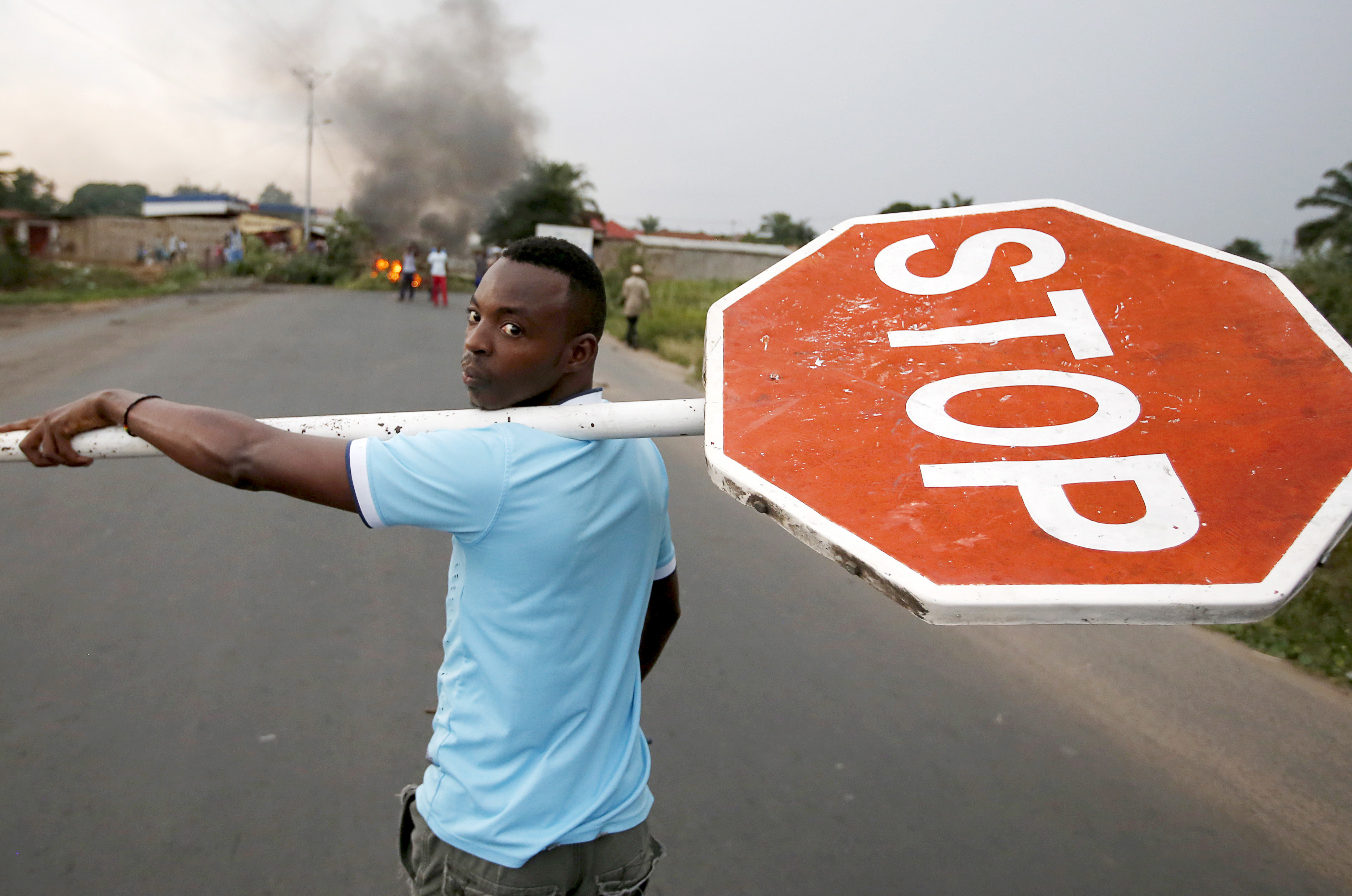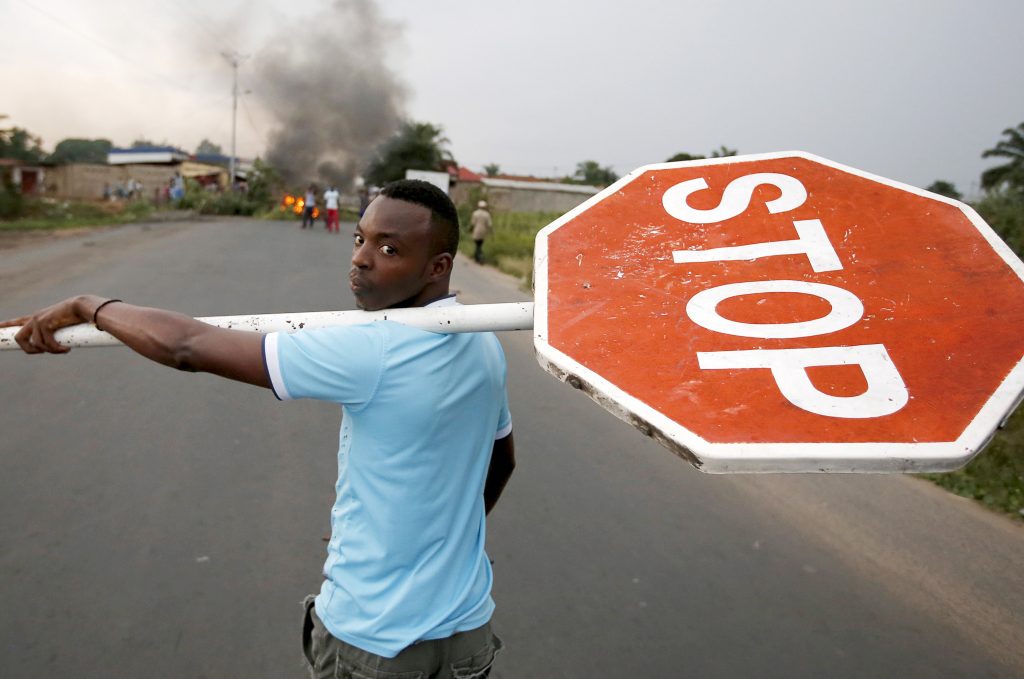 Residents of the small, central African nation of Burundi are voting July 21 to elect their next President. The election takes place after nearly three months of sometimes-violent protests and clashes both between rival groups and between demonstrators and Burundian police, sparked by current President Pierre Nkurunziza’s controversial third-term bid. In mid-May, an attempted coup d’état failed to dislodge Nkurunziza.
Residents of the small, central African nation of Burundi are voting July 21 to elect their next President. The election takes place after nearly three months of sometimes-violent protests and clashes both between rival groups and between demonstrators and Burundian police, sparked by current President Pierre Nkurunziza’s controversial third-term bid. In mid-May, an attempted coup d’état failed to dislodge Nkurunziza.
Originally scheduled for June 26, presidential polls were twice delayed due to deteriorating security conditions and regional pressure to find a solution to the months-long political crisis. In addition to the uncertainty caused by mass demonstrations, sporadic grenade attacks and politically-motivated violence are now common; more than 150,000 Burundians have fled to neighboring Rwanda, Tanzania, and the Democratic Republic of the Congo (DRC), leading international humanitarian organization Médecins Sans Frontières to report that Tanzania’s major refugee camp “has reached breaking point.”
In June, Nkurunziza’s party won a large majority of parliamentary seats (seventeen opposition parties boycotted the election). The US State Department noted “woefully inadequate conditions for free and fair elections,” and United Nations and African Union statements echoed similar judgments.
Shortly after parliamentary results were released, regional leaders from the East African Community (EAC) appointed Ugandan President Yoweri Museveni as a mediator for the crisis. Burundi’s opposition immediately rejected the selection of Museveni, and noted the irony of choosing a President who has served since 1986 to arbitrate in a crisis where term limits remain a central issue.
Nkurunziza’s Third Term
Those opposed to Nkurunziza have found their avenues for expressing dissent increasingly limited: what the UN electoral observer mission has described as a “climate of widespread fear” persists throughout the country as those opposed to the ruling party report intimidation, beatings, and assassination attempts by those loyal to Nkurunziza; a crackdown on media outlets seen as unfavorable to the ruling party has limited information flow. Some frustrated opposition members have broadcast threats of force against the government, an escalation that drew a US State Department condemnation.
Despite regional and international pressure to further delay elections, Nkurunziza and the ruling party have resisted, citing constitutional provisions requiring that the vote take place no later than thirty days before the President’s current term expires in August. Polls are underway July 21 as scheduled, and are likely to be disrupted only by sporadic, low-level violence.
Nkurunziza’s major opponents are boycotting the polls to show their discontent, and to illustrate their conviction that the elections are neither free nor fair. It is likely that, as in parliamentary elections, voter turnout will be particularly low in opposition strongholds.
Nevertheless, Nkurunziza is likely to win a third presidential term handily.
Barring unforeseen circumstances, he will then be inaugurated, and the EAC will accept the election’s result, paving the way for the AU’s acceptance and, eventually, the acquiescence of most of the international community. The regional community will put pressure on the President to include some opposition representation in his government, although whether the members chosen will have much impact on the government’s decisions remains to be seen. Meaningful mediation is unlikely to continue after the presidential inauguration, and Nkurunziza’s party will continue to dominate politics in Burundi.
Exporting Lessons for Engagement
This situation offers an important opportunity to reflect on what went wrong in Burundi, and how the United States (and the rest of the international community ) might have more effectively intervened to prevent—or, at least moderate—the current political crisis.
US engagement with the contentious issue of Nkurunziza’s third term specifically and with Burundians’ political grievances more generally only began in a meaningful way in April of this year, when the first waves of refugees raised alarms with the international community.
The ideal time for engagement between the United States and other partners and Burundi would have been more than a year ago, when Burundi’s parliament failed narrowly to amend the constitution to allow Nkurunziza to run for a third term. By the time thousands of Burundians took to the streets of the capital Bujumbura to protest the President’s third term bid and, later, what many deem a flawed constitutional court ruling, it was too late to reverse course.
Elections approach in a number of other African countries, including nearby Rwanda and the Democratic Republic of the Congo, both of which share the controversial issue of whether a head of state can legally extend his term. The United States must take this opportunity to learn from Burundi: engagement must be deep, and it must begin before the first signs of trouble.
Kelsey Lilley is Assistant Director of the Atlantic Council’s Africa Center. Follow her on Twitter at @KelseyDegen.
Image: A protester carries a traffic sign during a protest against Burundi's President, Pierre Nkurunziza, and his bid for a third term in Bujumbura, Burundi, May 26. Burundi is set to hold the presidential election July 21 amid continuing unrest over Nkurunziza's bid. (Reuters/Goran Tomasevic)
